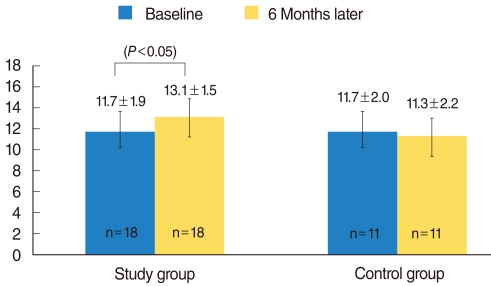Clin Exp Otorhinolaryngol.
2011 Jun;4(2):72-76.
Is Cognitive Function in Adults with Hearing Impairment Improved by the Use of Hearing Aids?
- Affiliations
-
- 1Department of Otorhinolaryngology, Eulji University School of Medicine, Seoul, Korea. eardoc11@eulji.ac.kr
- 2Department of Neuropsychiatry, Eulji University School of Medicine, Seoul, Korea.
Abstract
OBJECTIVES
In the present study, we investigated whether speech-related cognitive function and speech recognition ability under background noise in adults with hearing impairment are improved with the use of hearing aids.
METHODS
Participants were recruited from the ENT Department of Eulji Hospital from September 2008 to July 2009. The study group comprised 18 participants (mean age, 69.5+/-8.3 years) with sensorineural hearing loss who were fitted with hearing aids, and the control group comprised 11 participants of equivalent age (mean age, 63.1+/-11.8 years) who were not fitted with hearing aids. All participants were assessed using the computerized Korean visual verbal learning test (VVLT) and words-in-noise (WIN) test prior to fitting of hearing aids for the study group and initially for the control group. Both groups were reassessed in both tests after 6 months. For each group, differences in the results between the two assessments were compared using the Friedman test.
RESULTS
There was no difference in mean age between the study group and control group. In the study group, total VVLT score (reflecting short-term memory) was significantly improved from before hearing aid use to 6 months after hearing aid use (P<0.05), and VVLT recognition score (reflecting learning ability) was also significantly improved from before hearing aid use to 6 months after hearing aid use (P<0.05), but there was no change in the control group. For VVLT latency score (reflecting efficiency of memory) and speech discrimination score in the WIN test, no statistically significant difference was found between the initial and 6-month assessments in the study group or in the control group (P>0.05).
CONCLUSION
The speech-related cognitive function of individuals with hearing impairment improved after using hearing aids. This finding indicates that hearing aids may induce acclimatization of the central auditory system.
Keyword
MeSH Terms
Figure
Reference
-
1. Humes LE, Burk MH, Coughlin MP, Busey TA, Strauser LE. Auditory speech recognition and visual text recognition in younger and older adults: similarities and differences between modalities and the effects of presentation rate. J Speech Lang Hear Res. 2007; 4. 50(2):283–303. PMID: 17463230.
Article2. Lunner T. Cognitive function in relation to hearing aid use. Int J Audiol. 2003; 7. 42(Suppl 1):S49–S58. PMID: 12918610.
Article3. Anstey KJ, Luszcz MA, Sanchez L. A reevaluation of the common factor theory of shared variance among age, sensory function, and cognitive function in older adults. J Gerontol B Psychol Sci Soc Sci. 2001; 1. 56(1):P3–P11. PMID: 11192335.
Article4. Syka J. Plastic changes in the central auditory system after hearing loss, restoration of function, and during learning. Physiol Rev. 2002; 7. 82(3):601–636. PMID: 12087130.
Article5. Rauschecker JP. Auditory cortical plasticity: a comparison with other sensory systems. Trends Neurosci. 1999; 2. 22(2):74–80. PMID: 10092047.
Article6. Ponton CW, Vasama JP, Tremblay K, Khosla D, Kwong B, Don M. Plasticity in the adult human central auditory system: evidence from late-onset profound unilateral deafness. Hear Res. 2001; 4. 154(1-2):32–44. PMID: 11423213.
Article7. Mulrow CD, Aguilar C, Endicott JE, Tuley MR, Velez R, Charlip WS, et al. Quality-of-life changes and hearing impairment: A randomized trial. Ann Intern Med. 1990; 8. 01. 113(3):188–194. PMID: 2197909.8. Tesch-Romer C. Psychological effects of hearing aid use in older adults. J Gerontol B Psychol Sci Soc Sci. 1997; 5. 52(3):P127–P138. PMID: 9158564.
Article9. van Hooren SA, Anteunis LJ, Valentijn SA, Bosma H, Ponds RW, Jolles J, et al. Does cognitive function in older adults with hearing impairment improve by hearing aid use? Int J Audiol. 2005; 5. 44(5):265–271. PMID: 16028789.
Article10. Carhart R, Tillman TW. Interaction of competing speech signals with hearing losses. Arch Otolaryngol. 1970; 3. 91(3):273–279. PMID: 5414080.
Article11. Kwon JS, Lyoo IK, Hong KS, Yeon BK, Ha KS. Development and standardization of the computerized memory assessment for Korean adults. J Korean Neuropsychiatr Assoc. 2002; 3. 41(2):347–362.12. Chang YL, Bondi MW, Fennema-Notestine C, McEvoy LK, Hagler DJ Jr, Jacobson MW, et al. Brain substrates of learning and retention in mild cognitive impairment diagnosis and progression to Alzheimer's disease. Neuropsychologia. 2010; 4. 48(5):1237–1247. PMID: 20034503.
Article13. Wolk DA, Dickerson BC. Alzheimer's Disease Neuroimaging Initiative. Fractionating verbal episodic memory in Alzheimer's disease. Neuroimage. 2011; 1. 54(2):1530–1539. PMID: 20832485.
Article14. Braden JP. Intellectual assessment of deaf and hard-of-hearing people: a quantitative and qualitative research synthesis. Sch Psychol Rev. 1992; 21(1):82–94.
Article15. Schneider BA, Daneman M, Pichora-Fuller MK. Listening in aging adults: from discourse comprehension to psychoacoustics. Can J Exp Psychol. 2002; 9. 56(3):139–152. PMID: 12271745.
Article16. Henrichsen J, Noring E, Lindemann L, Christensen B, Parving A. The use and benefit of in-the-ear hearing aids: A four-year follow-up examination. Scand Audiol. 1991; 20(1):55–59. PMID: 1842270.17. Song SJ, Shim HJ, Park CH, Lee SH, Yoon SW. Analysis of correlation between cognitive function and speech recognition in noise. Korean J Otorhinolaryngol-Head Neck Surg. 010; 4. 53(4):215–220.
Article18. Gatehouse S. Apparent auditory deprivation effects of late onset: the role of presentation level. J Acoust Soc Am. 1989; 12. 86(6):2103–2106. PMID: 2600300.
Article19. Gatehouse S. The time course and magnitude of perceptual acclimatization to frequency responses: evidence from monaural fitting of hearing aids. J Acoust Soc Am. 1992; 9. 92(3):1258–1268. PMID: 1401514.
Article20. Sekuler R, Blake R. Sensory underload. Psychol Today. 1987; 12. 21(12):48–53.
Article
- Full Text Links
- Actions
-
Cited
- CITED
-
- Close
- Share
- Similar articles
-
- The Effect of Visual and Hearing Impairment on Depression and Cognitive Function in Community-dwelling Elderly: The Korean Longitudinal Study of Aging 2008
- Association between age-related hearing loss and cognitive decline
- Influence of Cochlear Implantation on Cognitive Function in Elderly Patients
- Association of Age-Related Hearing Losswith Cognitive Decline
- Management of Hearing Aids Clinic





